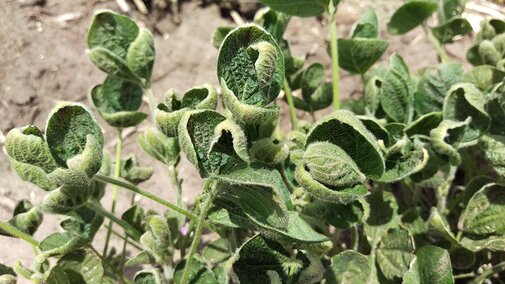Nebraska Extension educators, county offices, and extension specialists started receiving phone calls about suspected dicamba off-target injury in sensitive soybean fields, ornamental trees, vegetables, tree nurseries, and home gardens earlier this month. We are in the process of estimating the number of acres affected in Nebraska.
There were certain instances where off-target movement was potentially from dicamba-based products applied in corn. Many dicamba-based products labeled in corn can cause symptoms on sensitive crops similar to those caused by XtendiMax, Engenia, or FeXapan would cause.
Nebraska is not the only state with potential dicamba injury issues. In fact, Missouri, Kansas, Iowa, Indiana, Illinois, Tennessee, Mississippi received dicamba off-target injury complaints.
A University of Missouri researcher, Kevin Bradley, is compiling injury estimates. His June 15 report is at https://ipm.missouri.edu/IPCM/2018/6/dicambaInjuryUpdate/.
What should growers do if they have potential dicamba injury in field?
- First, it is important to identify dicamba injury symptoms correctly.
- Scout the field to get an idea of how widespread the injury is. Take photos and notes. Start communication with your neighbors, pesticide applicators, etc.
- If you decide to file a complaint, contact the Nebraska Department of Agriculture at 402-471-2351.
Further updates will be posted to CropWatch in the near future.
For recommendations on applying dicamba to avoid or reduce off-target injury to sensitive crops, see cropwatch.unl.edu/tags/dicamba.
Background
Roundup Ready 2 Xtend (dicamba/glyphosate-resistant) soybean, also known as Xtend bean, became commercially available for the 2017 growing season. That year approximately 500,000 acres in Nebraska were planted with Roundup Ready 2 Xtend soybean. In 2018 that increased to about 3.5 to 4 million acres.
The new dicamba-based formulations XtendiMax, Engenia, or FeXapan are labeled for application in Xtend soybean. Sometimes application of dicamba, a phenoxy group herbicide, can result in off-target movement through physical drift or volatility. It also can occur through tank contamination if the spray tank was not cleaned properly.
A number of broadleaf crops and plants are sensitive to dicamba including non-dicamba tolerant soybean, grapes, tomato, watermelon, pumpkin, and several minor vegetable crops raised in Nebraska.

